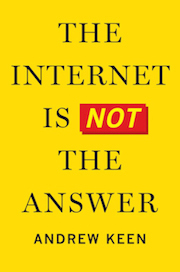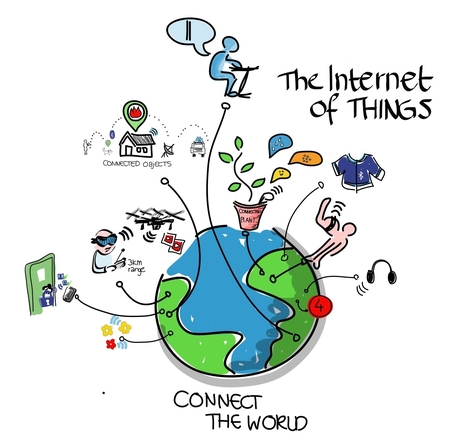Big Bang XIII, a forum for exploring new ideas and new technologies was a different event than its predecessors. Instead of introducing attendees to some of the hottest new startups, my partner, Ken Hertz, and I hosted two distinguished speakers with diverse backgrounds and opinions about the Internet.
This time we had a spirited philosophical discussion -- and, at times, argument -- about what the Internet means to society. Should it be celebrated as a great, equalizing and democratizing communications channel, or should it be feared for destroying privacy and wiping out a large swath of middle class businesses and performers?
The opening speaker, Andrew Keen, takes the latter view. Keen is the author of the highly anticipated book The Internet is not the Answer, in which he argues that the Internet -- more precisely the World Wide Web -- has done far more harm than good. Keen's earlier books, Digital Vertigo and The Cult of the Amateur, took a similarly skeptical stance of social media and other aspects of Internet culture.
Keen described his new book as a critique of Web 2.0 and UGC. He said that, "the Internet economy has been idealized." He continued, "It's really hard to make a living as a blogger, independent musician, or video star." Keen maintained that although anyone can access information and participate in the new economy, the practical result has been monopolies from big companies and the destruction of much of the middle class.
"We're living in a digital world and the operating system is the Internet. The digital world," Keen claimed, "is the merging of the Internet and society: business relationships, politics and personal relationships."
He preemptively denied that he was a digital Luddite. "I'm not against technology. I'm as wired as anyone," he adamantly claimed. "But I want to hold the Internet up to its own principles. The internet wasn't just a disruption, wasn't just another innovation; it represented a chance to change everything. The Internet was going to be the equalizer, do away with the privilege of the wealthy and give everyone a way to be an entrepreneur."
"In fact," he stated, "the reverse is true. What we're seeing is a pure market of a winner-take-all economy. We're seeing massive monopolists: Google, Facebook, Amazon, etc. There are exceptions, of course, but we're largely seeing the disappearance of the old middle."
At this point, Ken Hertz jumped in and asked, "Who are the bad guys?"
Keen failed to identify a specific actor as the culprit or culprits. Instead, he pointed to the lack of regulation as the cause of the Internet's worst aspects. "What the internet culture has done," he said, "is destroy both the past and the future. We live in a perpetual present."
"The Internet was supposed to be social," he continued. "But our only interest is in not connecting. We're left with a 'selfie economy.' All we want to do is broadcast ourselves."
Various members of the audience pitched into the battle. One said, "Google makes a big deal about being altruistic. Their technology leads to free content, but they're selling the advertising around it." Several people brought up examples of how a middle class of musicians is shrinking, and another brought up a parallel example with professional photographers.
When presented with examples by Keen and others that showed that the Long Tail economy hasn't developed, Ken Hertz countered with, "That hasn't changed. Ten years ago 32,000 albums were released a year. Only 250 of them sold more than 10,000 copies."
Hertz, while admitting that, "The Internet has become corporatized and monetized, but not democratized," continued to challenge Keen. "Is your indictment of web-based market economies," Hertz asked, "or is your argument that the Internet is a bad thing?"
Towards the end of his talk, Keen cited new services such as Uber and Airbnb that are facing myriad legal and practical problems: "The answer isn't just to shut these companies down. Disruption, by definition, isn't bad, just as it isn't good. It needs to be regulated. It's creating new monopolies and allows mass larceny, if we allow it to exist."
He continued, "The digital revolution, of course, has been as profound as the industrial revolution. The answer is in recognizing these profound changes and recognizing that we need grown-ups. We need regulations and direction."
"Go back to the 19th century to realize that we need government to step in and regulate. If it comes unregulated," he concluded, "then we really are screwed."
At that point, our second speaker, Dr. Len Kleinrock stepped to the front. Dr. Kleinrock is considered one of the fathers of the Internet. He created the mathematical theory of packet switching, the technology underpinning the Internet. Dr. Kleinrock was part of the true Big Bang of technology. His host computer at UCLA became the first node of the Internet in September 1969, and a month later he directed the transmission of the first message to pass over the Internet.
Kleinrock traced the early years of the Internet, moving from its birth in 1969 to the invention of the web in 1989. He emphasized that the early engineers of the Internet were focused on creating something that allowed "ideas to be shared and communities to be formed, where distances didn't matter. "And," he said simply, "There was no thought of making money."
He also mentioned the problems that have developed. He reminded us of the famous New Yorker cartoon that featured two dogs, with the caption that read, "On the Internet, nobody knows you're a dog." Kleinrock said, "Now we know you're a dog, we know where you are and we know what kind of dog you are."
He still carries an optimistic outlook for the Internet. He cited the same resource-sharing services -- Uber and Airbnb -- that Keen brought up: "These services use resources that lie fallow most of the time." He continued with a vision of a more constructively connected world, "The Internet should disappear into the infrastructure. The embedded technology that we have should know that I'm here. This computer should know me; it should automatically give me access to all of my files and materials."
Kleinrock also talked about the dark side of the Internet: commercial exploitation, denial of service attacks, identity theft, etc. "What should we have done?" he asked. We didn't worry about security in those days. One of the problems in the early days was getting people to join the Internet."
He admitted that stronger security could have been built in. "But that wouldn't have stopped the bad things," he said. "It would merely have delayed them. We should have strong user authentication and strong file authentication. I should be able to articulate what privacy rights apply to me. Or at least if there's not a perfect match, I should at least be able to know what policy applies to me."
The discussion of privacy rights launched a renewed fundamental debate in the crowd about the Internet's promise versus the stark-and sometimes dark-reality. People hotly debated the loss of privacy, the destruction of quality journalism and the need for Internet regulation.
"Stop confusing the technology and the bad players within it," said Ken Hertz.
"Should we leave things as they are?" countered Andrew Keen.
Someone else said, "The village idiots have a louder voice than the village elders."
One of the more interesting observations came from a long-time A&R person (a musical talent scout). Bringing the discussion back to music and entertainment, he posited that both models-traditional stars such as Bob Dylan and Internet sensations such as Justin Bieber-can coexist. He said, "My criteria for evaluating talent has changed. There's a brand new lane of cultural and creative talent. It's a separate channel for distribution for people who are digital marketing savvy."
We'll leave the last word to Dr. Kleinrock. During his talk, he picked up on one of Andrew Keen's key themes: "Andrew talked about needing grownups. Let's remember that the Internet has only entered its teenage years," he said, "and it does everything that a teenager does."


